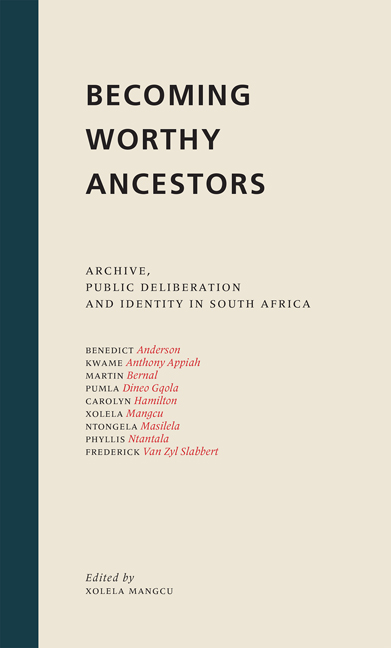Book contents
- Frontmatter
- Contents
- Preface
- Chapter One Evidentiary Genocide: Intersections of Race, Power and the Archive
- Chapter Two The Transmission Lines of the New African Movement
- Chapter Three Some Do Contest the Assertion That I Am An African
- Chapter Four Africa in Europe, Egypt in Greece
- Chapter Five Unconquered and Insubordinate: Embracing Black Feminist Intellectual Activist Legacies
- Chapter Six Identity, Politics and the Archive
- Chapter Seven The Goodness of Nations
- Chapter Eight Why Archive Matters: Archive, Public Deliberation and Citizenship
- Endnotes
- Index
Chapter One - Evidentiary Genocide: Intersections of Race, Power and the Archive
Published online by Cambridge University Press: 21 March 2018
- Frontmatter
- Contents
- Preface
- Chapter One Evidentiary Genocide: Intersections of Race, Power and the Archive
- Chapter Two The Transmission Lines of the New African Movement
- Chapter Three Some Do Contest the Assertion That I Am An African
- Chapter Four Africa in Europe, Egypt in Greece
- Chapter Five Unconquered and Insubordinate: Embracing Black Feminist Intellectual Activist Legacies
- Chapter Six Identity, Politics and the Archive
- Chapter Seven The Goodness of Nations
- Chapter Eight Why Archive Matters: Archive, Public Deliberation and Citizenship
- Endnotes
- Index
Summary
MEMORY, POWER AND NATION BUILDING
Central to this book are questions of memory, archive, identity and public deliberation. These chapters consider why it matters that nations should care for their archives, and why those archives should inform discussions about a sense of shared identity. I deliberately distinguish between shared identity and common identity, for while we cannot speak of a common identity and experiences, even within a group of people, the concept of ‘shared identity’, by definition, suggests the existence of multiple individuals and groups who have a stake in the continued existence of the nation.
But this book does not seek to settle age-old debates about shared identity in pluralist societies. Its aim is to highlight how the archive is often employed to make certain identity claims and, in the process, to privilege certain identities’ histories over others. At its worst, this claim-making leads to the genocide of individuals and groups in the name of the nation or, conversely, the genocide of the nation in the name of groups. As Benedict Anderson puts it in his chapter: ‘No nation looks forward to happiness in Heaven, or torment in Hell. What it fears is the quite earthly: the possibility of extinction through genocide.’ To use a cliché, memory becomes the weapon, quite literally.
Archbishop Desmond Tutu has explained the role that memory plays in affirming individual and group identity – but also as a weapon of extinction:
My identity is linked very intimately to my memory … What I know is what I remember, and that helps to make me who I am. Nations are built through sharing experiences, memories, and a history. That is why people have often tried to destroy their enemies by destroying their histories, their memories, that which gives them an identity.
The physical genocide of groups and nations is thus often preceded by what I would call evidentiary genocide. Public deliberation around issues of identity and archive becomes both the means and the end of interrogating those identity claims, and of exposing their use in the service of power.
- Type
- Chapter
- Information
- Becoming Worthy AncestorsArchive, Public Deliberation and Identity in South Africa, pp. 1 - 16Publisher: Wits University PressPrint publication year: 2011



